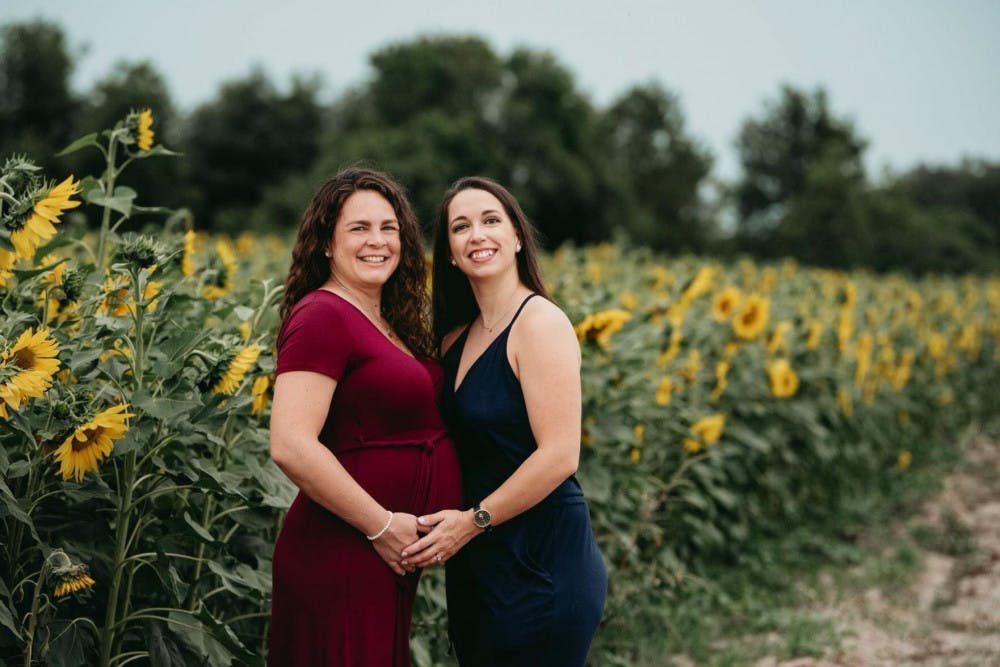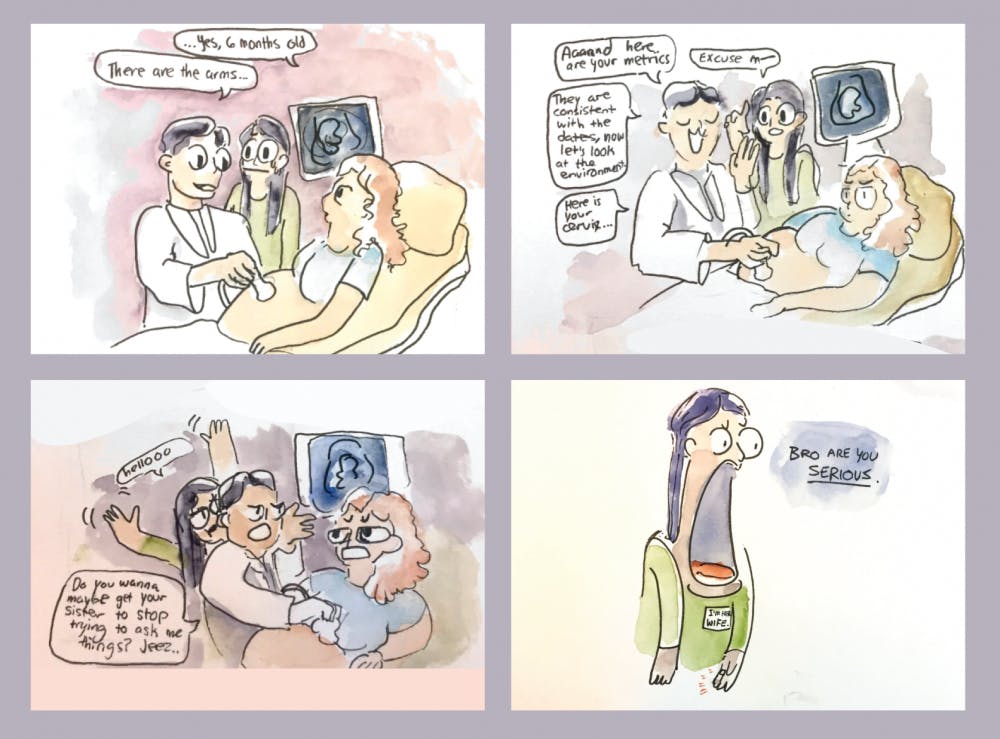
Adrianna and Ashley Tousignant celebrate their pregnancy in a field of sunflowers. Their baby boy was born June 19.
After an exhausting four hours of pushing, Adrianna Tousignant looked down. In her arms was a 9-pound, 1-ounce baby boy—it was one of the greatest moments of her entire life, she said.
Even better, she said, was watching her wife, Ashley Tousignant, hold their son, Henry.
Adrianna, 31, and Ashley, 32, fell in love while bartending at Gator’s Dockside in Gainesville six years ago. Nearly two years later, they were married and immediately began working on having a child. It took them three years to get pregnant.
Same-sex couples have two options for having children: adoption or assisted reproductive technology, which includes methods of conception, like in vitro fertilization, traditionally used to treat infertility. This technology allows for same-sex couples to obtain either a sperm or egg donation and have a child that shares genetics with one parent. Two men would also need a surrogate, a woman who carries and births the child for the couple.
According to Marla Neufeld, a Florida surrogacy attorney, there are no laws in the state preventing same-sex couples from using assisted reproductive techonology to have a child. However, same-sex couples worry about potential future legal issues and social stereotypes when going through the process.
The non-biological parent had to “second parent adopt” to officially have parental rights prior to 2015, when the supreme court declared same-sex marriage legal in all 50 U.S. states, Neufeld said. Second-parent adoption is a two-month process that involves a petition, finger-printing, a background check and a home-study under Florida’s adoption laws.
Now, parents can avoid this process, if married, because a married couple has presumed parentage under Florida law.
However, like many other LGBTQ+ couples, Adrianna and Ashley said they fear the same-sex marriage law will one day be reversed. On June 12, the Trump administration reversed Obama-era health care protections for transgender people and redefined “sex discrimination” as applying to females and males. The protections do not include discrimination based on sexual identity or sexual orientation.
For extra security, Ashley, who did not carry the baby, is considering adopting their child.
Neufeld said she recommends that the parents do a stepparent adoption after the baby is born in case laws change, even though they're both on the birth certificate. Over the course of a month, the couple would file an adoption petition, attend an adoption hearing and attain a stepparent judgment. A court order is a stronger protection than a birth certificate, which is only a presumption of parentage, Neufeld added.
Ashley and Adrianna said they first began their journey of having a child with intrauterine insemination, a treatment where a sperm is placed inside a woman's uterus to initiate fertilization. To fertilize, the sperm needs to reach the actual egg on it’s own.
This didn’t work.
Adrianna, who volunteered to carry the baby, then tried to medically increase her chances of getting pregnant by having endometriosis surgery. Endometriosis is a complication with the tissue that normally grows on the inside lining of the uterus. In surgery, the doctor removes the tissue, which then increases a woman’s chance of getting pregnant.
The surgery also didn’t lead to a pregnancy, so they decided to switch to IVF, a process where the egg is fertilized with sperm outside of the body and transferred to the uterus.
Finally, three years later, they were pregnant.
“Without knowing if you have fertility issues, it's kind of a crapshoot,” Adrianna said.
She said they carefully decided who would be the sperm donor because they wanted to make sure the baby also had Ashley’s characteristics—her dark brown straight hair and average height.
Ashley said it's a different experience for the partner who is not the one giving birth. When going to doctor’s appointments, she said, staff would assume she was a family member and not the other parent. She even said a doctor completely ignored her once.

“You still feel like you have to kind of fight for your rights,” Ashley said. “Especially from a female standpoint. Even though you're not the one that's actually doing the pushing and going through everything, you're still an important factor, and should be treated just the same as a dad.”
Ashley said they had a great delivery experience together. However, dealing with paperwork after birth was tricky. When applying for their son for a social security number, the representative initially only took down Adrianna’s number and had to return to the hospital room for Ashley’s after the representative realized their mistake.
“Being the partner, it was a different experience,” Ashley said. “Probably not as pleasant I think as others might experience or a heterosexual couple.”
Both Ashley and Adrianna said they worry about the current political climate and feel they have to continue fighting for their rights. In January, Tennessee Gov. Bill Lee signed a bill which allows adoption agencies to deny a couple the opportunity to adopt based on religious or moral objections. The couple said they worry something similar will happen in Florida in the future.
“It’s just like a tornado, that you don't know where it's going to hit, or how destructive it could potentially be,” Adrianna said.
However, there are positives too, the couple said. The U.S. Supreme Court outlawed discrimination against the LGBTQ+ community in the workplace on June 15.
Adrianna said she believes times are changing. Hopefully for the better, she added. The couple plans to have more children and just bought a house in Fort White together. She said Henry was definitely worth the wait.
The couple wants Henry to grow up knowing it's OK to be whoever he wants to be. Adrianna said the most important thing a child needs is support and love.
“Love makes a family,” Adrianna said.
Contact Emma at ebautista@alligator.org. Follow her on Twitter @emma_V_bautista.





